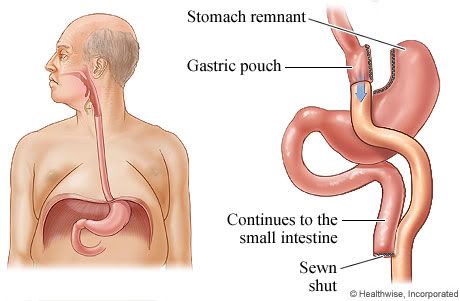Gastric bypass does more than just reduce weight
Gastric-bypass surgery may provide benefits to patients with type 2 diabetes beyond the benefits that can be directly attributed to weight loss, a new study finds [1]. 
According to Dr Blandine Laferrère (St Luke's Roosevelt Hospital, New York, NY) and colleagues, recent studies that show a strong correlation between the concentrations of plasma branched-chain amino acids (BCAAs) and related metabolites with insulin resistance and loss of insulin sensitivity raise the possibility that the rapid remission of diabetes seen in many diabetic patients after gastric-bypass surgery may be related to the pronounced changes in BCAAs or other metabolites and not the weight loss alone.
In a study published in the April 27, 2011 issue of Science Translational Medicine, Laferrère et al compared the spectrum of amino acids and acylcarnitines in patients who lost 10-kg weight after gastric bypass with that of similar group who lost the same amount of weight through diet alone. Measurement of circulating amino acids and acylcarnitines in blood plasma with targeted tandem mass spectrometry before and after each patient's weight loss showed that the total amino acids and BCAAs decreased in the gastric-bypass-surgery group but not in the dietary-intervention group. Also, the metabolites derived from BCAA oxidation decreased only in the surgery group. Levels of acylcarnitines and BCAAs and their metabolites were inversely correlated with proinsulin concentrations, the C-peptide response to oral glucose, and the insulin-sensitivity index after weight loss, whereas the BCAAs and their metabolites were uniquely correlated with levels of insulin resistance.
These data suggest that the enhanced decrease in circulating amino acids that follows weight loss after gastric-bypass surgery is caused by a mechanism other than weight loss and may be related to why gastric-bypass patients often show more rapid improvement in glucose homeostasis than similar patients who lose weight without surgery, Laferrère et al conclude. However, the authors caution, "Whether the decrease in these metabolites and the implied activation of fuel oxidation is a cause or consequence of the diabetes remission after gastric bypass remains to be determined. . . . Future studies will further characterize the pathways involved in these metabolic alterations and will seek to understand whether the specific metabolic signature of [gastric-bypass surgery] is related to changes in gut peptides after surgery."
In an accompanying perspective [2], Drs Robert E Gerszten and Thomas J Wang (Harvard University, Boston, MA) agree that "further work is needed to establish whether the reduction in concentrations of circulating amino acids after weight loss is the cause or a consequence of improvements in insulin sensitivity."
Circulating amino-acid concentrations are likely to be determined partly by genetics and partly by environmental and nutritional factors, they explain, so "dissecting these effects will require nutritional manipulation studies with a variety of amino acids to be conducted in human subjects, especially given the availability of profiling technologies that permit characterization of the molecular consequences of such interventions," the editorialists state.
参考文献:
1).Laferrère B, Reilly D, Arias S. et al. Differential metabolic impact of gastric bypass surgery versus dietary intervention in obese diabetic subjects despite identical weight loss. Sci Transl Med 2011; 3:80re2.
2).Gerszten RE, Wang TJ. Two roads diverge: Weight loss interventions and circulating amino acids. Sci Transl Med 2011; 3:80ps15.
-April 29, 2011 | Reed Miller ( http://www.theheart.org/article/1218365.do )